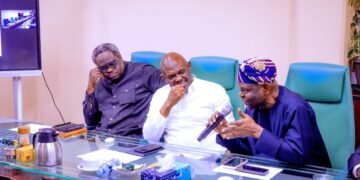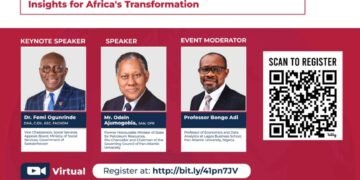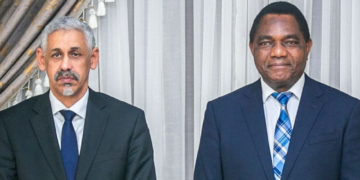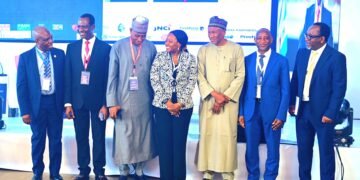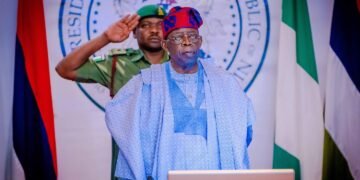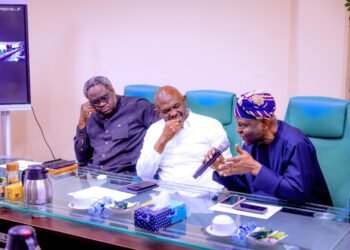Lesotho’s 2022 general election, its tenth since its independence from Britain in 1966, was unique in more ways than one.
It was the first election since the political transition of 1993 to be about key issues facing the nation, rather than personalities. This is largely due to the exit from active politics of Motsoahae Thomas Thabane of the All Basotho Convention and Pakalitha Mosisili of the Democratic Congress. They had dominated Lesotho’s politics for over two decades.
With the exception of Monyane Moleleki of the Alliance of Democrats, the contenders were new to the political scene. This made the contest interesting and exciting as many citizens yearned for change.
A record 65 parties contested the election.
The winning party, Revolution for Prosperity, led by businessman Samuel Ntsokoane Matekane, was formed just six months ahead of the election. Its campaign message centred on governance and economic growth. This focus also influenced the party’s coalition agreement with the Alliance of Democrats and Movement for Economic Change.
The party’s overwhelming victory – it won 56 of the 120 seats – was as surprising as its emergence.
With the benefit of hindsight, there are three main factors that help explain the party’s victory.
These are the country’s poor socio-economic conditions, disenchantment with politics and the concerted efforts by the traditional leaders to withdraw support for the All Basotho Convention and the Democratic Congress.
The Matekane-led coalition government will need to make concerted efforts to address the socio-economic problems, restore faith in politics and deepen the country’s democracy and peace. Failure to deliver will dash citizens’ expectations. The low public trust in government institutions will decline further.
Factors that swayed voters
First, socio-economic conditions had deteriorated considerably, especially under the coalition governments led by All Basotho Convention and Democratic Congress since 2012. The COVID pandemic made conditions worse.
More than half of Lesotho’s 2.2 million people live in poverty. Around 24.6% of the population is unemployed. Youth unemployment stands at 37.4%. Lesotho is among most unequal societies in the world. Social discontent worked in favour of new parties.
Second, public faith in elections has been waning, as reflected by declining voter turnout since 1993. Voter turnout was 46.4% in 2017 and declined to 37.7% in 2022.
Public trust in the executive, parliament and judiciary and in political parties has declined over the years due to poor governance. Corruption in the public sector is a major reason for mistrust.
In contrast, public trust remains high for non-elective institutions such as the army, churches, chiefs and the king.
Citizens perceive politics as serving interests of the elites at the expense of the broader national purpose. Basotho were determined to see the Democratic Convention and All Basotho Convention out of state house.
Third, the traditional leaders, who form the core of the upper house of parliament (the Senate), influenced voters’ choices against All Basotho Convention and Democratic Congress. The traditional leaders made it publicly known that they were unhappy with the failure of the national reform process.
The reform was initiated at the behest of the Southern African Development Community in 2014 with a view to restoring security, peace and political stability in Lesotho. But the National Assembly and Senate could not agree on the proposals from the National Reforms Authority – a statutory body which was tasked with driving the reform agenda.
The chiefs blamed the coalition government for this failure.
Both state and non-state actors will have to make concerted efforts to entrench Lesotho’s democracy in order to anchor peace, and improve socio-economic conditions. There are six areas they can focus on:
More resources and effort have to go into addressing underdevelopment, poverty, hunger, unemployment and inequality.
More investment needs to be earmarked for democracy and peace education to reverse the trend of democracy fatigue. This manifests in voter apathy and dwindling public trust in governance institutions.
Public funding for political parties has to be revisited to stem the proliferation of parties. The current formula gives parties money for campaigns even before they test their electoral strength – an exercise in futility.
New regulations governing private funding and external technical assistance to parties should be introduced to safeguard Lesotho’s sovereignty and guard against state capture.
Concrete steps have to be taken to combat corruption in both public and private sectors.
The electoral commission’s case in the Constitutional Court should be resolved by constitutional means to avoid a post-election political crisis. The case seeks to reallocate about four compensatory proportional representation seats to smaller parties.
The vote for the new party and its leader was largely a protest vote against the All Basotho Convention and Democratic Congress grand coalition government and their failure to improve the lives of the people – which have worsened because of CO
Lesotho’s 2022 general election, its tenth since its independence from Britain in 1966, was unique in more ways than one.
It was the first election since the political transition of 1993 to be about key issues facing the nation, rather than personalities. This is largely due to the exit from active politics of Motsoahae Thomas Thabane of the All Basotho Convention and Pakalitha Mosisili of the Democratic Congress. They had dominated Lesotho’s politics for over two decades.
With the exception of Monyane Moleleki of the Alliance of Democrats, the contenders were new to the political scene. This made the contest interesting and exciting as many citizens yearned for change.
A record 65 parties contested the election.
The winning party, Revolution for Prosperity, led by businessman Samuel Ntsokoane Matekane, was formed just six months ahead of the election. Its campaign message centred on governance and economic growth. This focus also influenced the party’s coalition agreement with the Alliance of Democrats and Movement for Economic Change.
The party’s overwhelming victory – it won 56 of the 120 seats – was as surprising as its emergence.
With the benefit of hindsight, there are three main factors that help explain the party’s victory.
These are the country’s poor socio-economic conditions, disenchantment with politics and the concerted efforts by the traditional leaders to withdraw support for the All Basotho Convention and the Democratic Congress.
The Matekane-led coalition government will need to make concerted efforts to address the socio-economic problems, restore faith in politics and deepen the country’s democracy and peace. Failure to deliver will dash citizens’ expectations. The low public trust in government institutions will decline further.
Factors that swayed voters
First, socio-economic conditions had deteriorated considerably, especially under the coalition governments led by All Basotho Convention and Democratic Congress since 2012. The COVID pandemic made conditions worse.
More than half of Lesotho’s 2.2 million people live in poverty. Around 24.6% of the population is unemployed. Youth unemployment stands at 37.4%. Lesotho is among most unequal societies in the world. Social discontent worked in favour of new parties.
Second, public faith in elections has been waning, as reflected by declining voter turnout since 1993. Voter turnout was 46.4% in 2017 and declined to 37.7% in 2022.
Public trust in the executive, parliament and judiciary and in political parties has declined over the years due to poor governance. Corruption in the public sector is a major reason for mistrust.
In contrast, public trust remains high for non-elective institutions such as the army, churches, chiefs and the king.
Citizens perceive politics as serving interests of the elites at the expense of the broader national purpose. Basotho were determined to see the Democratic Convention and All Basotho Convention out of state house.
Third, the traditional leaders, who form the core of the upper house of parliament (the Senate), influenced voters’ choices against All Basotho Convention and Democratic Congress. The traditional leaders made it publicly known that they were unhappy with the failure of the national reform process.
The reform was initiated at the behest of the Southern African Development Community in 2014 with a view to restoring security, peace and political stability in Lesotho. But the National Assembly and Senate could not agree on the proposals from the National Reforms Authority – a statutory body which was tasked with driving the reform agenda.
The chiefs blamed the coalition government for this failure.
Deepening Lesotho’s democracy and peace
Both state and non-state actors will have to make concerted efforts to entrench Lesotho’s democracy in order to anchor peace, and improve socio-economic conditions. There are six areas they can focus on:
- More resources and effort have to go into addressing underdevelopment, poverty, hunger, unemployment and inequality.
- More investment needs to be earmarked for democracy and peace education to reverse the trend of democracy fatigue. This manifests in voter apathy and dwindling public trust in governance institutions.
- Public funding for political parties has to be revisited to stem the proliferation of parties. The current formula gives parties money for campaigns even before they test their electoral strength – an exercise in futility.
- New regulations governing private funding and external technical assistance to parties should be introduced to safeguard Lesotho’s sovereignty and guard against state capture.
- Concrete steps have to be taken to combat corruption in both public and private sectors.
- The electoral commission’s case in the Constitutional Court should be resolved by constitutional means to avoid a post-election political crisis. The case seeks to reallocate about four compensatory proportional representation seats to smaller parties.
The vote for the new party and its leader was largely a protest vote against the All Basotho Convention and Democratic Congress grand coalition government and their failure to improve the lives of the people – which have worsened because of COVID – and the botched national reform process.
Basotho’s expectations are extremely high and the new coalition government has to deliver tangible changes fast, some of them within the first 100 days.
VID – and the botched national reform process.
Basotho’s expectations are extremely high and the new coalition government has to deliver tangible changes fast, some of them within the first 100 days.



